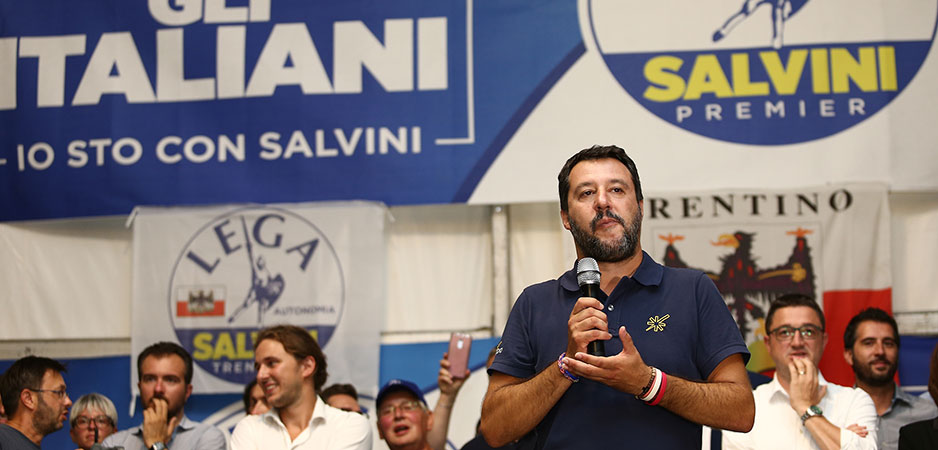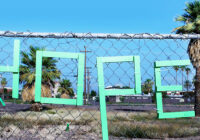In no country in Europe has COVID-19 claimed more victims than in Italy. Similarly, nowhere in Europe has the radical populist right benefitted more from the pandemic than in Italy. At the beginning of April, polls had Italy’s two major radical right-wing populist parties — Matteo Salvini’s Lega (League) and Giorgia Meloni’s Fratelli d’Italia (Brothers of Italy) — at more than 40%. In France, Marine Le Pen has largely been sidelined by the crisis, whereas in Germany, the radical right has engaged in an internal power struggle. In Italy, however, the leaders of the radical populist right have managed to get major exposure in the media, independent of political orientation, allowing them to propagate their take on current events.
Italy was one of the founding members of the process of European integration. It is a core member of the European Union and among the first countries to adopt the euro. And yet, Italy has never been a part of the exclusive club encompassing Germany and its allies — France and the Benelux countries. The recent controversy over the question of the euro bonds (aka “corona bonds”) demanded by the Italians but rejected by the Germans and Dutch, is a prominent case in point.
Coronavirus Outbreak Exacerbates Italy’s Political Divisions
The latter promised help, but only via the European stability mechanism, subject to stringent surveillance measures. As a result, tensions grew between Italy and its EU partners, poisoning the political climate and giving way to mutual recriminations. In the end, a compromise was found, but by then, the damage had been done. Public opinion polls over the past few weeks have shown to what extent the COVID-19 crisis, and particularly the EU’s more than hesitant response to it, has soured Italians’ views of the European Union.
Already in mid-March, more than two-thirds of Italian respondents agreed with the statement that EU membership was a “disadvantage” for Italy. Two weeks later, more than 75% thought that the EU had done nothing to confront the crisis. By the beginning of April, according to a major poll, fewer than 30% of Italians expressed trust in the European Union and its major institutions. At the same time, almost half of respondents said they were ready to see Italy leave the EU. Not for nothing did the Financial Times warn that Europe “risked losing Italy.”
Divine Intervention
If this is bad, it might get even worse. While the EU has largely failed to provide the support Italy was entitled to expect from its partners, it has done a splendid job in boosting the fortunes of Italy’s radical right at a time when the latter was completely sidelined. Last year, the League was part of a coalition government; its leader, Matteo Salvini, was an important minister. In August 2019, Salvini called for a vote of no-confidence with the expectation that it would lead to new elections; instead, it resulted in a new coalition government, without the League. This was a major miscalculation that saw Salvini completely written off — until the epidemic hit Italy with full force.
COVID-19 has allowed the Italian radical right to promote itself as the ultimate defender of Italy’s sovereignty in the face of the EU and, more importantly, as the defender of the country’s honor. Both the League and the Brothers of Italy (the name comes from the first line of the Italian national anthem) appeal to deep-seated emotions which appear to resonate among a large part of the Italian population. In the case of Salvini, this is religion, namely the appeal to the archaic roots of Italian Catholicism, where the lines between religion and superstition blur. In the case of the Brothers of Italy, it is the appeal to Italian nationalism, rooted in Italian fascism.
Genealogically, the Brothers of Italy derive their roots from the Movimento sociale italiano (MSI), the postwar political movement “inspired” by fascism. The MSI was a neo-fascist party that was an intricate part of Italy’s postwar political system. In the mid-1990s, the party’s leader, Gianfranco Fini, publicly renounced Italy’s fascist history, reinventing the MSI as a new center-right party — Alleanza nazionale (National Alliance) — which, together with Umberto Bossi’s Lega Nord (later rebranded as the League by Salvini), became part of the Berlusconi governing coalition. The Brothers of Italy are the successors of the National Alliance, and their new leader Giorgia Meloni’s ideological roots are in the MSI’s youth movement.
With Meloni, the Brothers mark a return to the tortuous history of Italian fascism. In 2019, the party chose Caio Giulio Cesare Mussolini as a candidate for the European elections. His bid failed. But media-wise, Meloni is omnipresent — as is Matteo Salvini. A divorcee and father of two children by two different women, to only one of whom he was married, Salvini is hardly a paragon of Catholic values. Yet he has no qualms promoting himself as a devoted Catholic. His detractors might see this as blatant hypocrisy; his numerous followers, however, don’t seem to mind.
For a year now, Salvini has invoked the Virgin Mary as the guiding light for his political adventures. It all started at a League mass meeting in Milan in May 2019, a few days ahead of the European elections. Waving a rosary in his hand, Salvini invoked the Virgin Mary, whose “immaculate heart” would “carry us to victory” in the election. In the months that followed, Salvini has missed no opportunity to display his religious devotion, publicly kissing the cross attached to his rosary, calling upon the virgin to protect the country, promoting the Madonna of Medjugorje. (Medjugorje is a small town in Bosnia and Herzegovina where, in 1981, the madonna appeared to seven children — now a destination for hundreds of thousands of Catholics from all over the world every year despite the fact that the Vatican has never officially recognized the apparition as a miracle.)
Salvini went on record stating that science was not enough “to defeat the monster” (the coronavirus). What was needed was divine intervention by il buon dio — the good Lord.
Salvini’s public confounding of the spiritual and the secular has provoked considerable irritation, not least from the Italian Catholic Church and the Vatican, which have repeatedly criticized his instrumentalization of faith for political ends. For the League, Salvini’s religious devotion, genuine or not, has proven to be a winning strategy. It has a strong appeal in the southern parts of the country where, unlike in the League’s northern strongholds of Lombardy and Veneto, Catholicism is still part of daily life. Also, it has allowed the League to reaffirm its image as a resolute defender of Europe’s Judeo-Christian heritage in the face of Islam, an image that is perfectly in line with the League’s slogan, “Prima gli italiani” — “Italians first.”
Defending Italy
At the same time, Salvini’s strategy has also reinforced the League’s ties with the Brothers of Italy and Meloni. The latter have been the big winners of the COVID-19 crisis: In the European elections last year, the Brothers of Italy received a bit more than 6% of the vote. Just under a year later, the party stood at more than 12% in the polls, almost doubling its support base. The reason is simple: the Brothers are unabashedly nationalist. On their website the slogan “Difendiamo l’Italia” — “Let’s Defend Italy” — is prominently displayed. The Brothers are as much “Italians first” as they are “proud to be Italian.”
It is arguably the latter which explains the party’s appeal and which makes it the ideal complement for the League, given the latter’s political genealogy. The League started out as a northern movement, giving voice to widespread resentment in Italy’s most industrious and affluent regions against the country’s political class, charged with “robbing” the north of the fruits of its labor in order to buy votes in the populous south. Underlying the Northern League’s rhetoric was a strong tinge of ethnocentrism directed against the southern half of the country and its inhabitants, dismissed as “terroni” who lived off assistenzialismo (state benefits).
Central to the Northern League’s political program was federalism, which would lead to the transfer of major powers, particularly with regard to taxes, from the central government to the regions. Umberto Bossi went so far as to threaten secession and the formation of an independent state, Padania, if the party’s demands were not met.
They were not. The Northern League served in several government coalitions under Berlusconi, yet federalism never saw the light of day. And for good reason, which brings us back to the Brothers of Italy. Berlusconi’s center-right coalitions included not only the Northern League, but also the National Alliance. The latter derived much of its electoral strength from voters in the south, for whom the Alliance represented a kind of political insurance against the Northern League. In recent years, this role was taken over by the Five Star Movement (M5S), which became the new political representative of southern assistenzialismo.
With M5S in decline, it is reasonable to expect that the Brothers of Italy will try to fill its shoes. The party’s political program is tailor-made for a country utterly disillusioned with the promises of European solidarity, which turned out to be little more than a meaningless phrase. As a leading Italian newspaper put it with respect to the euro bonds question, in this highly critical situation, the Germans and Dutch had made it known that national interests are more important than European solidarity.
Even before the crisis, Meloni used graphic language to attack the Italian political establishment, which she charged with having sold out Italy’s interests and which she accused of getting down on its knees “to lick the feet of the French and Germans.” At the same time, she played the anti-Islamic card, promoting the Brothers of Italy as a shield against the “Islamization of Europe,” affirming that she had no interest in seeing Europe become “a Muslim continent.” On the contrary, she and her party stood for the defense of Italy’s identity, of God, the fatherland and the family.
No Empty Threat
Maloni’s discourse is largely in line with the ideas promoted by Salvini. In fact, Meloni and Salvini are, as the saying goes, a match made in heaven. Both espouse a profound aversion to the European Union and its institutions, which only increased in the wake of the EU’s deplorable response to the COVID-19 crisis. As Salvini put it at the end of March, instead of presenting itself as a genuine community, the EU turned out to be nothing more than a “lair of serpents and jackals.” He also threatened that once the crisis is resolved, Italy might very well turn its back on the EU.
These are hardly empty threats. The Brothers and the League say out loud what a large majority of Italians think. No future Italian government will be able to ignore the profound sense of disenchantment with the European Union, the equally profound anti-immigrant and anti-Islamic sentiments festering among a large majority of Italian voters. The end of the crisis is very likely to engender further opportunities for the two parties to increase their support base.
Expectations are that Italy’s economy will contract by about 9% this year, perhaps even more. Unemployment is likely to go up considerably, as will the number of Italians in absolute poverty. Under the circumstances, resentment against the EU is likely to remain high and with it the temptation of going it alone, of abandoning the idea of a common European destiny. Following in the footsteps of the British is a real possibility. Who would have thought so, just 12 months ago?
*[The Centre for Analysis of the Radical Right is a partner institution of Fair Observer.]
The views expressed in this article are the author’s own and do not necessarily reflect Fair Observer’s editorial policy.
Support Fair Observer
We rely on your support for our independence, diversity and quality.
For more than 10 years, Fair Observer has been free, fair and independent. No billionaire owns us, no advertisers control us. We are a reader-supported nonprofit. Unlike many other publications, we keep our content free for readers regardless of where they live or whether they can afford to pay. We have no paywalls and no ads.
In the post-truth era of fake news, echo chambers and filter bubbles, we publish a plurality of perspectives from around the world. Anyone can publish with us, but everyone goes through a rigorous editorial process. So, you get fact-checked, well-reasoned content instead of noise.
We publish 2,500+ voices from 90+ countries. We also conduct education and training programs
on subjects ranging from digital media and journalism to writing and critical thinking. This
doesn’t come cheap. Servers, editors, trainers and web developers cost
money.
Please consider supporting us on a regular basis as a recurring donor or a
sustaining member.
Will you support FO’s journalism?
We rely on your support for our independence, diversity and quality.






